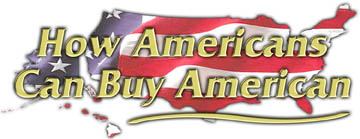 Supporting American-Made Products and Services from American-Owned Companies |
What those who oppose steel and aluminum tariffs really oppose
Our Buy American Mention of the Week! by Roger Simmermaker March 22, 2018 Free trade advocates have reacted predictably negatively to President Trump's proposed tariffs on steel and aluminum, which was announced on March 8 and will take effect on March 24. The predictable and overwhelming reason free traders oppose the tariffs is that it may help some Americans who work in the steel and aluminum industries but will supposedly hurt Americans who consume products that contain steel and aluminum through higher prices. Free traders believe that any time a company or corporation is faced with higher production cost burdens (higher wages, increased regulation, health care costs, etc.) that they must automatically recover these costs in the form of higher prices to the consumer. That's not always true - and is especially untrue now - since the Tax Cuts and Jobs Act of 2017 became law and corporations are reaping much higher profits as a result. In short, free traders mistakenly believe those who are negatively affected by the tariffs will outnumber those who will be positively affected. Put more simply, they believe the tariffs will "hurt more Americans than they will help." Therefore, the tariffs are bad policy. That's an interesting analysis, when you think about it. At least until you apply the same type of analysis to other political issues. If you are against the tariffs because you subscribe to the theory that they will "hurt more Americans that they will help," then you must also be against the following: 1. Equal pay for women Its no secret that women typically make less than men for the same work in many industries. If women were paid the same as men in the industries where they currently are not, that would raise their wages, and result in higher prices for all the goods and services to which they contribute. Since the gender wage gap, according to TD Bank Economics as reported in the Wall Street Journal on February 26, 2018, stands at 18.1%, that means prices on any number of goods and services could rise over 18% if women were paid as much as men. Ending the gender pay gap would mean that only a certain percentage of women would be helped (positively affected), but potentially every consumer would be hurt (negatively affected) by higher prices. So, the free traders who are against steel and aluminum tariffs must also be, by definition, advocates on the gender pay gap and against equal pay for women. 2. A lower unemployment rate As the unemployment rate goes down, employers typically must pay higher wages to attract a shrinking available labor force. Inflation also tends to rise, resulting in even higher prices. Economists (the same ones who in droves support free trade) call this the Phillips Curve. As more unemployed workers become employed and benefit from higher wages, the rest of us will pay higher prices from the higher labor cost associated with a lower unemployment rate. So, free traders who are against steel and aluminum tariffs because they think consumers will end up paying higher prices must also be advocates for a higher unemployment rate. 3. Higher wages for yourself Free traders must surely be against raises and higher wages for themselves. Why? Because in this scenario, only they benefit. Everyone else pays higher prices for the goods or services in which they are involved. For example, you could be a newscaster for one of the major news networks (Fox, CNN. MSNBC, etc.). Higher wages for newscasters at Fox News, for example, result in higher costs for News Corporation (which owns Fox News). This can result in a higher cost for companies that advertise on Fox News, which in turn can cause them to raise prices for consumers. If Pepsi advertises on Fox News, for example, and the wages of newscasters at Fox receive higher wages, News Corp. may find it necessary to charge Pepsi higher advertising rates to recover those higher wage costs. Pepsi may then in turn find it necessary to raise the prices of any or all their products, including Pepsi-Cola, Mountain Dew, Aquafina, Lay's potato chips, Tropicana orange juice, and Fritos. So, in this example, newscasters who are against steel tariffs must also be against wage raises for themselves, since higher wages for them will "hurt more Americans than it will help." You don't have to be involved in manufacturing for your higher wages to affect prices for everyone else, as outlined in the examples above. In summary, any economic policy will result in both winner and losers. But steel and aluminum tariffs are overall winners for our economy. A closed steel mill in Granite City, IL has recalled 500 workers. In Florida, a new steel investment is creating 250 jobs. There are more examples. And the steel tariffs haven't even taken effect yet. We surely cannot continue without aluminum tariffs, either. Since 2000, 15 U.S. aluminum smelters have closed. Only three remain, and of those three, only one operates at full capacity. Protection of American industries is good for America. The first major bill signed by George Washington, after approving the Seal of the United States, called for various tariffs on imports and "the encouragement and protection of manufacturing" in America. This was the Tariff Act of 1789. President George Washington was not wrong to impose tariffs on imports to protect and encourage domestic manufacturing, and neither is our current president. 1953
|
